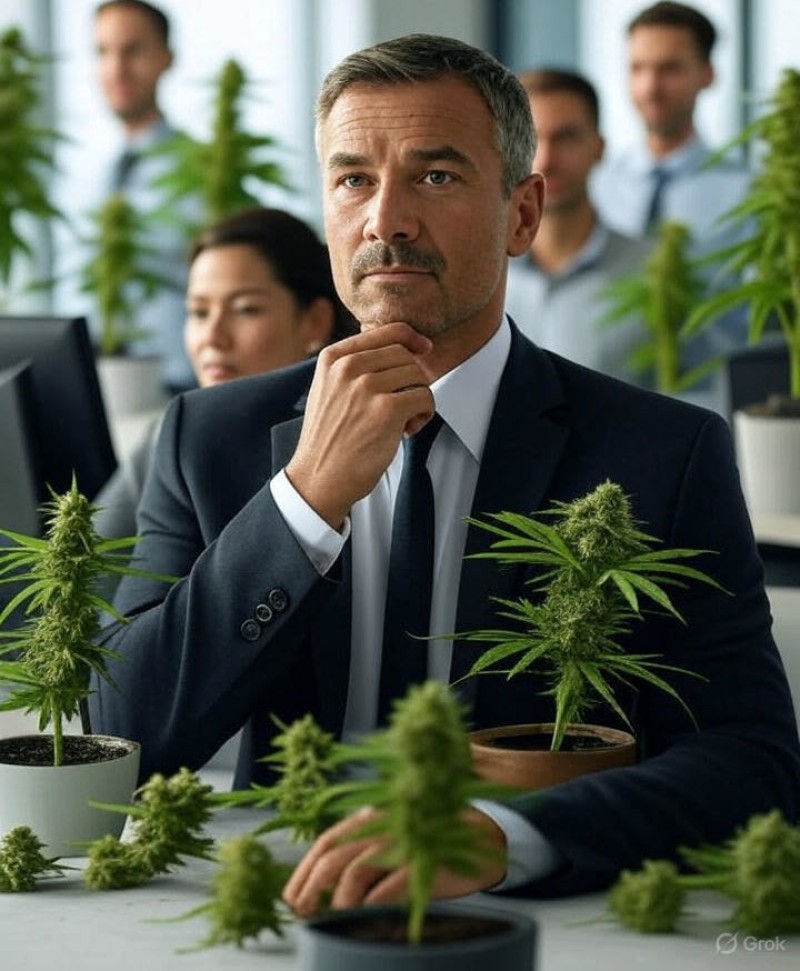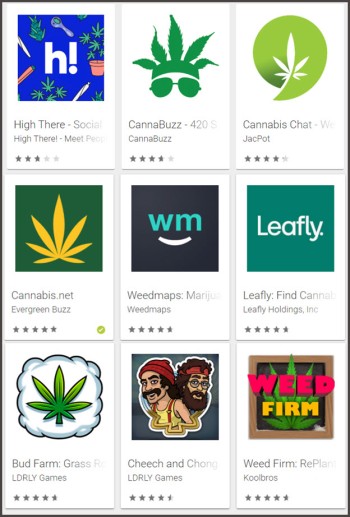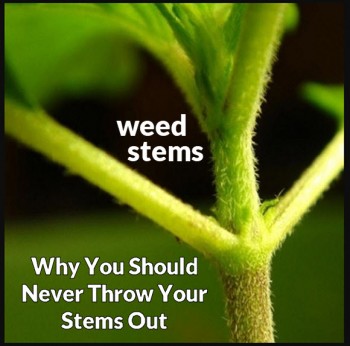
The old stereotype of the lazy, unmotivated stoner is officially dead. A new poll from NuggMD has delivered a devastating blow to prohibition propaganda by revealing that 54% of cannabis consumers report that marijuana use has had a positive impact on their careers - including 28% who describe that impact as "very positive." Only 10% reported negative career effects, while 36% said cannabis had no impact at all on their professional lives.
These findings represent more than just polling data - they represent a fundamental challenge to decades of workplace discrimination and drug war mythology that has painted cannabis users as inherently unreliable, unmotivated, and professionally incompetent. Instead, we're seeing evidence that cannabis consumers might actually have professional advantages over their abstinent colleagues in today's high-stress, always-connected work environment.
The reasons aren't mysterious when you understand how cannabis interacts with the psychological and physiological demands of modern work culture. Cannabis provides stress mitigation that helps workers manage job-related anxiety and pressure more effectively. It creates crucial boundaries between work and personal life that allow people to actually disconnect from job stress instead of carrying it home every night. It can improve sleep quality, which directly impacts job performance, creativity, and decision-making abilities.
Perhaps most importantly, cannabis helps many users develop a healthier relationship with work itself - viewing their careers as part of a balanced life rather than the singular focus of their existence. This psychological shift often leads to better job performance, improved workplace relationships, and more sustainable career trajectories that don't burn out from chronic stress and overwork.
While we can't make definitive causal claims based on survey data alone, the emerging research on cannabis and workplace performance suggests that prohibition advocates have had it backwards all along. Instead of hampering career success, responsible cannabis use might actually enhance it for many professionals.
Breaking Down the Data: Cannabis Users Outperforming Expectations
The NuggMD poll surveyed 493 cannabis consumers and found results that should make HR departments and workplace policy makers take notice. More than half of respondents reported career benefits from cannabis use, with the positive impacts significantly outweighing negative ones by a ratio of more than 5 to 1.
But this survey doesn't exist in isolation - it's part of a growing body of research that challenges fundamental assumptions about cannabis and workplace performance. A 2021 study funded partially by federal agencies found that adult-use cannabis legalization is associated with increased workforce productivity and decreased workplace injuries. This suggests that legal cannabis access might actually make workplaces safer and more efficient, not less.
A 2023 study went even further, finding that workers who use marijuana off the clock are no more likely to experience workplace injuries compared to abstinent employees. This research directly challenges the "zero tolerance" employment policies that have been justified based on unfounded assumptions about cannabis impairing workplace safety.
Workers' compensation data tells a similar story. While cannabis legalization is associated with a gradual increase in workers' comp claims, the average cost per claim actually falls after legalization, and patients reduce their use of prescription drugs, especially opioids and other painkillers. This suggests that cannabis users might be managing workplace injuries more effectively and requiring less expensive medical interventions.
The demographic breakdown of cannabis use among workers also challenges stereotypes. CDC analysis of federal health survey data found that food service, hospitality, arts, design, entertainment, sports, media, construction, and extraction workers report high rates of cannabis use. These aren't stereotypical "deadbeat" jobs - they're demanding careers that require creativity, physical skill, customer service abilities, and high performance under pressure.
Notably, workers in law enforcement, healthcare, and education report lower cannabis use rates - but this likely reflects employment drug testing and professional licensing requirements rather than personal preferences or job performance considerations. These workers might benefit from cannabis use but can't risk their careers to find out.
The pattern that emerges from this data suggests that cannabis users aren't concentrated in low-skilled or low-motivation jobs. Instead, they're found across the economic spectrum in demanding careers that require high performance, creativity, and stress management. This distribution is inconsistent with prohibition narratives about cannabis causing laziness or professional incompetence.
The Stress Management Advantage
Modern work culture is uniquely stressful in ways that previous generations of workers didn't experience. Always-on communication through smartphones and email means that work stress follows employees home, disrupting sleep, family time, and personal recovery. The psychological boundaries between work and life have eroded to the point where many professionals never truly disconnect from job-related anxiety and pressure.
Cannabis offers a pharmacological solution to this modern problem by providing stress relief that allows workers to actually transition from "work mode" to "life mode." THC and CBD both have anxiolytic properties that can help reduce job-related stress and anxiety, while the ritual of cannabis consumption creates a psychological marker that separates work time from personal time.
This stress management benefit isn't just about feeling better - it has direct professional implications. Chronic stress impairs cognitive function, decision-making abilities, creativity, and interpersonal skills. Workers who can effectively manage stress through cannabis use might actually perform better on the job because they're not constantly operating under the physiological and psychological burden of chronic stress activation.
Sleep quality represents another crucial factor in the cannabis career advantage. Many professionals struggle with work-related insomnia, lying awake replaying job stresses or planning the next day's tasks. Cannabis, particularly indica-dominant strains, can help users achieve better sleep quality by reducing racing thoughts and physical tension that interfere with rest.
Better sleep directly translates to better job performance. Well-rested employees make fewer mistakes, demonstrate better judgment, show more creativity, and maintain better relationships with colleagues and customers. If cannabis users are getting better sleep than their abstinent colleagues, they're likely showing up to work with cognitive and emotional advantages.
The creativity-enhancing effects of cannabis might provide additional professional benefits for workers in creative industries, problem-solving roles, or jobs that require innovative thinking. While cannabis doesn't magically make people creative, it can help users access different thought patterns and perspectives that might lead to breakthrough insights or novel solutions to workplace challenges.
The Work-Life Balance Revolution
Perhaps the most significant way that cannabis impacts career success is by helping users maintain healthier relationships with work itself. Instead of viewing their jobs as all-consuming identities that define their worth as human beings, cannabis users often develop more balanced perspectives that treat work as one important aspect of a multifaceted life.
This psychological shift has profound professional implications. Workers who maintain strong boundaries between work and personal life are less likely to experience burnout, more likely to sustain high performance over long career arcs, and often demonstrate better judgment because they're not emotionally over-invested in every workplace decision or conflict.
Cannabis ritual creates natural transition points between work and personal time. The act of consuming cannabis at the end of a workday provides a psychological signal that work time is over and personal time has begun. This ritual boundary-setting helps users actually disconnect from job stress instead of carrying it through their entire evening and weekend.
The mindfulness and present-moment awareness that cannabis can promote also helps users develop healthier relationships with workplace stress and conflict. Instead of ruminating endlessly about job problems or getting caught up in workplace drama, cannabis users might find it easier to maintain perspective and respond to challenges thoughtfully rather than reactively.
Social aspects of cannabis culture might also provide professional networking benefits. Cannabis consumers often connect over shared experiences and values, creating social bonds that can translate into professional opportunities. As cannabis use becomes more mainstream and acceptable, these social connections might become increasingly valuable for career development.
The reduced reliance on alcohol for stress management represents another potential professional advantage. While alcohol is socially acceptable for workplace stress relief, it often comes with productivity costs including hangovers, poor sleep quality, and impaired judgment. Cannabis users who substitute marijuana for alcohol might avoid these performance penalties while still getting stress relief benefits.
Industry-Specific Advantages
Different industries might see varying benefits from cannabis use among employees, depending on the specific demands and culture of each field. Creative industries - including arts, design, entertainment, and media - have historically embraced cannabis culture, and the poll data confirms high usage rates among these workers.
For creative professionals, cannabis might provide genuine job performance benefits by enhancing divergent thinking, reducing creative blocks, and helping users access novel perspectives on familiar problems. The altered state of consciousness that cannabis produces can help creative workers break out of routine thought patterns and explore new artistic territories.
High-stress industries like food service and hospitality also show high cannabis usage rates, which makes sense given the intense pressure, long hours, and customer service demands these jobs require. Cannabis might help workers in these fields manage stress, maintain positive attitudes during difficult shifts, and recover more effectively between work periods.
Construction and extraction workers also report high cannabis usage, despite the physical demands and safety considerations of these jobs. For these workers, cannabis might provide pain management benefits that help them perform physical labor more comfortably while reducing reliance on prescription painkillers that can cause more severe impairment.
The key insight across all industries is that cannabis users aren't concentrated in "easy" jobs that don't require high performance. Instead, they're found throughout demanding careers that require stress management, creativity, physical endurance, and interpersonal skills - exactly the areas where cannabis might provide performance benefits.
Professional workers in law, healthcare, and education show lower usage rates, but this likely reflects drug testing policies and professional licensing requirements rather than job performance considerations. These workers might benefit from cannabis use but can't risk their careers due to legal and regulatory constraints.
The Future of Cannabis-Friendly Workplaces
As cannabis legalization spreads and social acceptance increases, forward-thinking employers are beginning to reconsider their cannabis policies. Instead of reflexively implementing zero-tolerance drug testing, some companies are exploring cannabis-friendly policies that recognize the potential benefits of off-duty cannabis use.
"Wellness-focused employers need to get smarter about how today's workforce uses cannabis, because there's mounting evidence in favor of taking it seriously as a potential workplace benefit," Andrew Graham from NuggMD noted. This perspective represents a fundamental shift from viewing cannabis as a workplace liability to recognizing it as a potential employee wellness tool.
Companies that embrace cannabis-friendly policies might gain competitive advantages in recruiting and retaining talented employees who use cannabis for stress management, creativity enhancement, or medical purposes. As the data on cannabis and workplace performance continues to improve, cannabis-friendly policies could become a differentiating factor in competitive job markets.
The key is developing policies that distinguish between responsible off-duty use and problematic impairment. Just as employers don't prohibit off-duty alcohol consumption while maintaining standards against workplace intoxication, cannabis policies can recognize that off-duty use doesn't necessarily impact job performance.
Some companies are already experimenting with cannabis as an employee benefit, offering coverage for medical cannabis or providing education about responsible use. As research continues to demonstrate the professional benefits of cannabis use, these pioneering policies might become mainstream employment practices.
The Sticky Bottom Line: Redefining Professional Success
The NuggMD poll results represent more than just interesting data points - they represent a fundamental challenge to the assumptions that have justified decades of workplace cannabis discrimination. When more than half of cannabis users report career benefits from their consumption, we need to seriously reconsider whether prohibition-era workplace policies serve anyone's interests.
The evidence suggests that responsible cannabis use might actually enhance career success by providing stress management tools, improving sleep quality, enhancing creativity, and helping workers maintain healthier relationships with work itself. These benefits aren't just theoretical - they're being reported by hundreds of thousands of working professionals who've discovered that cannabis helps them perform better, not worse.
This doesn't mean that cannabis is appropriate for everyone or that workplace impairment should be ignored. But it does mean that we need to move beyond simplistic "reefer madness" assumptions and develop nuanced policies that recognize the complex realities of cannabis use among working professionals.
The old stereotype of the lazy stoner was always a myth, but now we have data proving it. Cannabis users aren't just keeping up with their abstinent colleagues - they're often outperforming them. It's time for workplace policies to catch up with this reality.
As cannabis legalization continues expanding and social acceptance grows, companies that cling to outdated cannabis policies risk losing talented employees to more progressive competitors. The future belongs to employers who recognize that cannabis can be a tool for employee wellness and performance enhancement, not just a liability to be managed.
The cannabis career advantage is real, measurable, and growing. Smart employers will figure out how to harness it rather than punish it.







